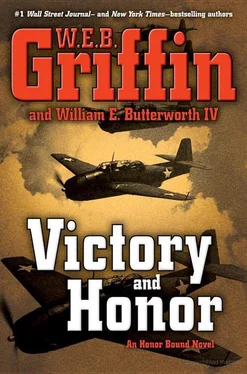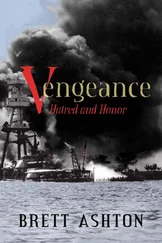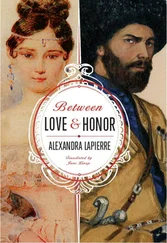“When what happened?”
“They call it the Seguro Obrero Massacre,” Stein said. “That’s the building that houses the health insurance ministry, or something like that.”
“What kind of a massacre?” Frade asked as he pulled the cork from another bottle of Cabernet Sauvignon.
“Nazis.”
“Who did the Nazis massacre?”
“The Nazis got massacred. She said what happened was that a Chilean Nazi—they called themselves ‘Nazistas’—named Jorge González von Marées got a bunch of college kids, and people that age, all fired up about National Socialism and Adolf Hitler, and they tried to stage a putsch.”
“When did this happen?”
“In 1938. Mother Superior was there filling in as a doctor in the emergency room at the Little Sisters’ Hospital in Santiago. Same order of nuns as here.”
Frade nodded as he topped off his glass and then slid the bottle to Stein.
“So,” Siggie said as he poured himself a glass, “what happened when this Nazi zealot did that . . . Wait. ‘Zealot’ is a really bad choice of word. The Zealots were Jewish warriors in Judea trying to throw the Romans out in the first century; they killed a lot of Romans because they just wouldn’t give up.”
They tapped glasses and took sips.
“Really nice wine,” Stein said, and went on: “Anyway, what this Chilean Nazi idiot did was convince about sixty of these young guys that all they had to do was take over a building at the university and the Seguro Obrero building and the people would rush to support them and National Socialism would come to Chile.
“According to Mother Superior, they could have caused real trouble, but while they probably didn’t stand a chance of taking over the country, they would have become heroic martyrs.”
“Exactly what did these Chilean Nazi lunatics do?”
“About half of them took over a building at the university, and the other half took over the health insurance building. The cops—they call them ‘carabineros’; they carry carbines—surrounded both buildings. Then the army sent a couple of cannons to the university building and fired a couple of rounds.
“The lunatics at the university surrendered. The cops—or maybe the army—then told them that what was going to happen now was that the lunatics were going to go to the health insurance building and convince the lunatics there that what they should do is surrender before anybody else got hurt.
“This made sense to the lunatics—they could see themselves being marched off to the slam while people cheered them, where they would be tried, jailed for a couple of months, and then be remembered all their lives as the heroes who brought Nazism to Chile with their bravery.
“So off they went to the health insurance building, where they talked the other lunatics into surrendering. When the others put down their weapons, the lunatics from the university were marched into the building, chased up the stairways, and then shot and/or bayoneted.”
“All of them?”
“Mother Superior was there with the ambulances from the hospital. She saw officers going around making sure they were all dead.” Stein mimed someone holding a pistol. “ Pop . You’re dead.”
“After they surrendered, they were killed?” Frade said.
“Somebody with power—I’d like to think it was a Jew, but there’s no telling—thought, ‘Now, wait a minute. If we just arrest these people, they’ll be back. On the other hand, if they resist and they all die, that would be unfortunate, but that would mean they won’t be causing any more trouble.’”
“Mother Superior agrees with that theory?”
“She knows that’s what happened. What she can’t understand is why I think it was a good idea.”
“Neither can I. That sounds like cold-blooded murder.”
“Colonel, what were you thinking when you turned your Thompson on Colonel—whatsisname? Schmidt?—and his officers?”
“I was thinking if any one of them managed to get their pistols out, they were going to shoot me.”
“That’s all?”
“Look, later, when I was trying to justify to myself shooting Schmidt, I managed to convince myself that I had also saved General Farrell’s life, and Pedro Nolasco’s.”
“And that’s all?” Stein pursued.
It took Frade a moment to reply.
“Okay, Siggie. I’m apparently very good when it comes to justifying what I’ve done that I’m not especially proud of. I told myself that I was responsible for turning the Tenth Mountain Regiment around, which meant they would not get into a firefight with the Húsares de Pueyrredón and that meant a lot of Schmidt’s troops and a lot of Húsares would not get killed. And that—I just said I’m really good at coming up with justifications—there wouldn’t be a civil war where a lot of innocent people would get killed. By the time I was finished, I had just about convinced myself that I was really Saint George and Schmidt was the evil dragon.”
Stein nodded. “Don’t be hard on yourself, Colonel. You did the right thing, and so did whoever ordered that the Chilean Nazis be killed. That stopped the Nazi movement in its tracks in Chile. God knows how many people would have been killed if the Nazis had taken over the country.”
“Why does this massacre make you want to go to Germany?”
“I told you, Colonel, I don’t understand it, but it does.”
“You’re not thinking of doing something more than pissing in the Rhine?”
“Say, shooting Nazis so they can’t rise Phoenix-like from the ashes?”
“That thought did run through my mind, Siggie.”
“No, sir,” Stein said, then went on: “Don’t look for some nice explanation why I can’t go with you, Colonel. All you have to say is ‘No way.’”
“Whatever happened to that Leica camera you used at Tandil?”
“I’ve still got it. You want it?”
“I don’t know who Perón is sending to Germany with me, and I don’t know who I’m going to bring back from Germany. And he’s not going to tell me. But if I had photographs I could show Nolasco, Martín, and as far as that goes, Körtig . . .”
“I’ll go get the camera.”
“No. You can just bring it with you when we go to Germany. You’ll go as the radio operator. In an SAA uniform.”
“Yes, sir. And thank you.”
“When we finish this bottle of wine, Sergeant, get on the radio to Estancia San Pedro y San Pablo. Tell Schultz what’s going on. Tell him to get blank OSS ID cards out of the safe and have them made out for von Wachtstein and Boltitz by the time we get there tomorrow. You still have yours, right?”
“Yes, sir. But you told me those IDs are not real . . .”
“They’re not. But people don’t know that. And in our business, Sergeant Stein, what people don’t know usually hurts them.”
Estancia San Pedro y San Pablo Near Pila, Buenos Aires Province 1305 15 May 1945
As the Red Lodestar, with Peter von Wachtstein at the controls, made its approach to the airfield, then smoothly touched down, Clete thought, There are some people born to be pilots, and ol’ Hansel is one of them .
“Don’t worry,” Clete said, “with a little practice—four, five hours shooting touch-and-gos, you’ll eventually get the hang of it. I’ll show you the tricks.”
It went right over von Wachtstein’s head.
His face showed he thought he’d been caught with his hand in the cookie jar.
“Just kidding, Hansel.”
“Alicia and I are going to Doña Claudia’s,” von Wachtstein then said. “What about Karl and Beth?”
“That depends on where Beth’s mother is,” Clete said. “That’s where they’ll go.”
Читать дальше












